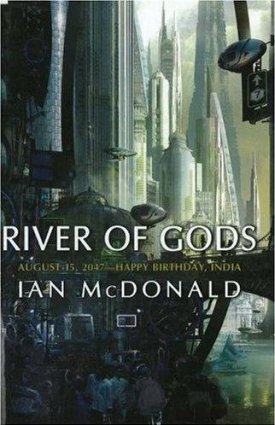Brian’s been wondering about SF from other cultures. There’s quite a lot of science fiction written in English by people outside the US, and this has always been the case. People in Britain, Ireland and the Commonwealth have been writing SF for as long as anyone has. (Van Vogt was Canadian, Stapledon and Clarke were British.) But on a panel on non-US anglophone SF at Boreal1 in 2006, we noticed an interesting trend.
The previous year the Hugo nominees had included Ian McDonald’s River of Gods and that year they included Robert Charles Wilson’s Spin. Geoff Ryman’s Air had just won the Tiptree and the Clarke Award. McDonald is Irish, Wilson and Ryman are Canadian. We naturally mentioned them, because if you’re talking about recent good SF written in English by non-Americans they’re directly relevant, but putting them all together like that another commonality sprang out.
The books are all straight future SF, directly extrapolated futures of this world, futures we can get to from here. River of Gods is set in India, large parts of Spin are set in Indonesia, and Air is set in a future Cambodia. (Since then, McDonald has written Brasyl, and of course he’d already written Chaga, US title Evolution’s Shore, and Kirinya, set in Africa.)
It’s nothing particularly new to set a book in an exotic location. But this isn’t that. In Spin the characters are visiting Americans, but in the others they’re all locals. The places are not treated as exotic, they’re treated science-fictionally, as real places that are going to be there and have their own future.
Science fiction futures typically give one assimilated planetary culture. This isn’t always blandly American, but it often is. I’ve noticed exotic (to me) American details taken as axiomatic—yellow school buses on other planets. I think there was a kind of “planetary melting pot” assumption going on somewhere unconsciously, as when Heinlein made Juan Rico Philipino.
I can certainly think of counter-examples. China Mountain Zhang has a realistically extrapolated China, for instance, and plenty of British writers have unexamined planetary melting-pot futures. But if you have “Space, the final frontier,” you’re immediately buying into all kinds of US ideas about frontiers, whether literally (as in Time Enough For Love) or more metaphorically. I think one of the axioms of Campbellian SF was “The US is going to space,” and indeed in those decades the US was making great leaps in that direction. Even now, SF is mostly published and read in the US. It’s reasonable that it mostly focus on an American future. But if you saw a non-US character, it was probably a token that the US characters had taken along. (I immediately think of the Arabic coffee-drinking guy in The Mote in God’s Eye, who has always bothered me not just for being such a cliche, because it’s supposed to be the twenty-sixth century. Never mind, the Cold War is still going on, too.)
I think paying attention to other countries as real places and setting stories in their real futures is an interesting trend. It isn’t SF coming from those other countries. It’s still SF being written in English by Westerners about them. Fabian Fernandez, a Brazilian SF writer said he wished a Brazilian had written McDonald’s Brasyl.
It also isn’t a subgenre. It doesn’t have a manifesto. I doubt if McDonald and Wilson and Ryman have ever sat down together and planned it—though if they did, I’d love to be a fly on the wall! But it has produced some excellent books, and I’d certainly be interested in any other recent examples.
(1) Boreal is a French-language convention with an English-language programming track. It’s usually in Montreal in May, though there isn’t one next year and in 2010 it’s in Quebec City. Program is done by Christian Sauve, who is one of the people responsible for the French program in next year’s Montreal Worldcon, Anticipation. He always has interesting program ideas, and as there aren’t all that many anglophone program participants at Boreal, I tend to get to discuss a wider range of things than I normally do. At an anglophone convention I tend to be put on panels that bear some relation to what I have written. At Boreal, as here, I get to talk more as a reader. I like that.










